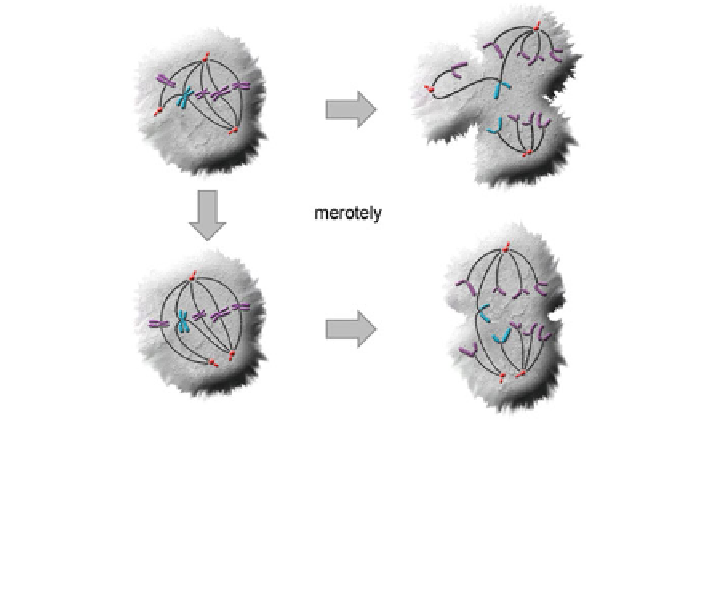Biology Reference
In-Depth Information
Fig. 17.3 Potential consequences of extra centrosomes. Cells with amplified centrosomes can
either divide in a multipolar fashion or cluster their supernumerary centrosomes into two spindle
poles. Whereas multipolar division is detrimental for cell viability likely due to gross aneuploidy,
centrosome clustering may serve as a survival mechanism to compensate for centrosome
amplification. Improper MT-kinetochore attachments like merotely are proposed to be enriched
in cells with extra centrosomes and give rise to aneuploid progeny upon centrosomal clustering.
(Adopted from Anderhub et al.
2012
)
attachment of MT from both spindle poles to a single kinetochore, accumulate, and
consequently increase the frequency of lagging chromosomes during bipolar anaphase
after centrosomal clustering (Ganem et al.
2009
; Silkworth et al.
2009
)(Fig.
17.3
).
Importantly, this finding implies that cells with amplified centrosomes do not neces-
sarily need to divide in a multipolar fashion to allow low-level chromosomal mis-
segregation that can fuel tumor progression. Such interpretation also supports the
emerging bimodal relationship between aneuploidy and tumorigenesis (Weaver et al.
2007
): whereas moderate CIN induced tumorigenesis in mice, high-level CIN sup-
pressed tumor formation in vivo. Suppression of tumor cell growth in this context
seems to be brought about by apoptosis induction due to loss of chromosomes encoding
genes required for maintenance of cell viability (Kops et al.
2004
). Likewise, in
patients with breast, ovarian, gastric and non-small cell lung cancer, extreme CIN is
associated with improved prognosis relative to tumors with intermediate CIN levels
(Birkbak et al.
2011
).
As already mentioned above, several studies have recently provided substantial
evidence for a causative role of CIN in malignant transformation. Similarly, the
key question of whether supernumerary centrosomes are simply a passenger
phenotype or can induce malignancy has now been addressed by constructing flies
that overexpress SAK (also known as polo-like kinase 4 (PLK4)), a kinase
important for centriole replication (Basto et al.
2008
). Flies overexpressing SAK

